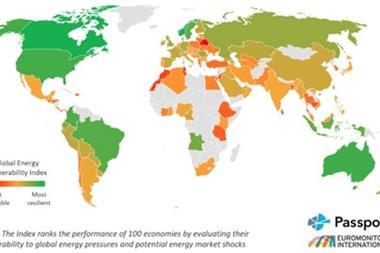The past ten years have seen a complete transformation of the role and status of the risk management profession. A decade ago a typical risk manager within a large or medium-sized company would have been engaged solely in purchasing hazard insurance and processing claims. Today's environment is much more complex. Greater resources are devoted to risk identification and mitigation across all aspects of an organisation's operations. Discussions on which risks to retain and which to transfer have to be taken in the context of the organisation's total appetite for risk. The organisation's risk appetite is more dynamic than ever before because of the uncertain environment in which we operate.
All these developments reflect unprecedented activity on the wider stage.
Terrorism and technology, in totally different ways, have re-fashioned the way we view the world, and attitudes to corporate governance have undergone a complete transformation. Now, the proficient risk manager needs to have a finger on the pulse of the organisation as a whole, with a multi-dimensional view of risk across lines of business, operations, and geography. That means not only helping to mitigate the cost side of the profit-and-loss equation, but also contributing to decisions about allocating capital, protecting the business against balance sheet volatility and even creating additional sources of revenue generation.
This evolution from a straightforward focus on protection from risk towards a strategic approach to the business's overall risk profile clearly presents new challenges for the profession. How is it to prepare itself for this dynamic role in terms of training and developing professional skills and aptitudes? And, equally importantly, how can we ensure that the more central role risk management plays in the prosperity and progress of the organisation is fully understood throughout the profession and shared by other corporate professionals?
Achievers
A recent study carried out in the US by Marsh and the Risk and Insurance Management Society (RIMS) throws light on the personal, professional, and organisational attributes that make up the successful risk manager.
The study concentrated on an extensive questionnaire and in-depth interviews with 30 top risk managers, who were chosen for having run the most effective risk management programmes within their organisations and for bringing in creative and innovative ideas in developing the risk strategies of their organisations.
The educational and business backgrounds of our sample of risk managers make very interesting reading. Not surprisingly for people at the top of their profession, more than two-thirds of them had graduated in advanced business and since then their roots had been well nurtured in the profession, with an average of 16 years working as risk managers. Interestingly nearly two thirds had worked for insurance brokers, insurers, or other insurance service providers at some time.
"This is the greatest job in the world. Risk managers are lawyers; they are doctors from their workers' compensation knowledge; they are finance people; they are contract managers; they are procurement people; they are human-relations people."
There were surprises, too. Job stability, for instance. In contrast to the US average of a job change every three years, more than half of the group had spent over ten years with the same firm. A likely reason for this is that, once high achievers find their niche in risk management, their increasing depth of insight into their company allows them to excel and be valued. The top performers mostly operated within a single unit, based at their organisations' headquarters. More than half of them had fewer than six people reporting to them. We are seeing, then, a trend towards lean, efficient risk management units at the heart of the enterprise.
Knowledge
Knowledge and the importance of acquiring more knowledge are at the core of the top risk manager's philosophy. One said, "I encourage my people to go for any and all the education they can get". These are individuals motivated by intellectual ambition. What is more, their role within the organisation seems to offer them career satisfaction and intellectual stimulation. That comes with a strong commitment to sharing their knowledge and raising the visibility of the profession. Almost all of the respondents, for instance, gave speeches at events, with topics ranging broadly from workers' compensation to lessons learned from September 11.
Success within the organisation seems to depend on risk managers blazing their own trails by demonstrating leadership qualities and innovation.
This means functioning on a variety of levels and taking on a broad range of tasks, including:
- claims administration and insurance placement
- risk identification and loss control
- litigation, safety, security and employee benefits
- creation and management of insurance captives.
Influence
Again, we see the natural progression from demonstrating technical risk management skills to having a significant impact on the organisation's bottom line. All participants in the survey agreed that their firms listened to the risk management department (over half strongly agreed). They cited as central to their role the ability to interact with senior management; to communicate, persuade and motivate; and to understand the financial, accounting, and tax implications of risk management strategies. One of the group put it succinctly: 'I have access to board members that we didn't have a decade ago'.
'Risk managers have to be able to establish relationships. The ability to build bridges is key. You have to be fair and ethical, and you have to have integrity.'
This ability to interact with senior management, as well as providing robust technical and analytical skills, is fundamental to the new role of the risk manager. The research sample of risk managers saw themselves as operating within a web of interrelationships. Their clients included senior directors, finance directors, new-product development managers, human resources, legal and tax departments. They built external alliances with their consultants, brokers and insurers, and relied on a range of trade and major business media to stay current on risk management issues and practices.
Brokers
Amongst all these relationships brokers were singled out as particularly important. Almost half the sample considered selected brokers to be trusted advisers. Just over one third of the participants used a single broker for all of their insurance needs. The majority dealt with multiple brokers, using individual experts for specific coverage areas, with little regard for geography or institutional affiliation.
"I've always had a very close relationship with brokers. To me, it's a very personal business. They become really familiar with the company's products, so they are really part of our team."
But the relationship with the broker is changing too. Where once the focus was on a reduction in the cost of premiums, leading risk managers now pursue such avenues as loss control and forms of risk financing and self-insurance to reduce the cost of risk. More recently we have seen further expansion of the role in the creating of profit from risk through providing third-party insurance and investment gains with captives. The prioritising of risks has also changed, with a new emphasis on assessing impacts on income, developing policies and procedures to address each risk, and establishing effective loss-control programmes.
"Successful risk managers need a basic understanding of contracts and of how claims and litigation scenarios work. Beyond that, you need to have some understanding of how to differentiate between insurance markets and hard and soft cycle - trying to recognise and create value in insurance relationships instead of just paying premium."
Data control
As we have seen, successful risk management relies on knowledge. Obtaining information, assessing its quality, and converting it to a usable form is the risk manager's ultimate challenge. Participants in the study have developed a hierarchy of information that builds on a base of claims and loss data. By applying analytical tools they can create trend information, internal benchmarking, and cost allocations specific to individual operating units. At the highest level, strategic insights can be acquired through external benchmarking and the use of incentive programmes to create a continual feedback loop of information from the field.
"There is no shortage of data. The real challenge in this business is to synthesise that data into insights on which one can take action."
The respondents described the ideal risk management information system as one integrating three information channels: an integrated claims database, operating unit data on claims and costs and a staff unit reporting on litigation and prioritisation.
Opportunities
What are the implications of this radical new role for the risk management professional? The American study strongly suggests that risk managers are looking to new horizons, including:
- a deeper understanding of the organisation, interacting closely with key operating units.
- a central role in the financial health of the company, requiring a strong foundation in finance, tax, and accounting.
- finding ways to use available systems more efficiently and to maximise data capture at its source.
Quite clearly, to achieve these goals the risk management profession must apply itself to attracting and training the most ambitious, enquiring and achieving young people.
Training
The nuts and bolts of professional training are well provided for in the UK. The Institute of Financial Services (IFS), for instance, offers an honours degree in financial services and associateship, which focuses on the disciplines of financial reporting and analysis, accounting and tax issues as well as strategic and analytical management skills.
Importantly for the risk manager, the degree is based around core modules and dedicated options or streams. The risk and insurance management stream covers areas such as management of insurance and reinsurance operations, and management information, as well as total cost analysis and risk financing.
What is more, the degree is structured so that students can tackle their specialist streams ahead of the game as a stand alone qualification - in this case as an advanced diploma in risk and insurance management - before embarking on the core modules of the BSc.
Inevitably there is more we can do in terms of training and qualifications and I would like to see an on-going debate between the profession and business schools and academics to consider the implications of the changing role of the risk management professional within the organisation.
The American survey points to enormous opportunities for risk managers to realise substantial benefits at the heart of their companies through continuous interaction with senior management. The key ingredients required include an understanding of field operations and the financial implications of risk, the leveraging of information technology, and the use of external expertise to create a virtual risk management organisation. All of these elements, mixed with a forceful personality and the willingness to take risks, will create the right combination to lead to success in the risk management profession.
"It is not moving from renewal to renewal. It is not moving from claim to claim or fire to fire. It is: How do I help my organisation take a competitive position as a result of what I do?"
Bruce Carnegie-Brown is CEO of Marsh Europe and deputy president of the Institute of Financial Services. The quotes in this article are taken directly from the Marsh/RIMS research study, 'Excellence in Risk Management' carried out in 2004.


















